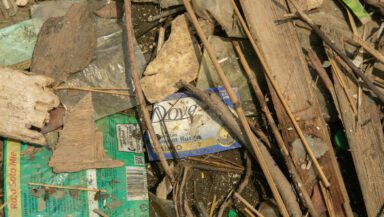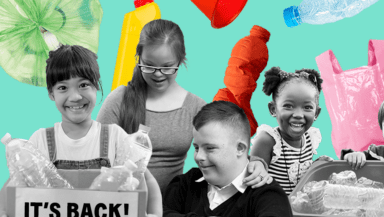UPDATE, 22 June 2020: Nearly 120 scientists, academics, and doctors have published a statement confirming that reusable containers (like coffee cups) are safe to use during the pandemic, as long as they’re washed properly. These experts say that normal household disinfectants work well on hard surfaces, such as reusable cups and containers.
During these stressful times, the oil and plastics industry wants you to think it’s safer to have food and other products wrapped in plastic. They’ve been peddling these myths in the media and to politicians in an attempt to boost their business.
There are many reasons why plastic is the material of choice in medical settings. But there’s a big difference between medical PPE, and packaging for food and other goods.
Here’s what you really need to know about plastic packaging when it comes to Covid-19.
There’s nothing particularly sanitary about plastic packaging
Unless you are talking about the medical-grade stuff, there is nothing intrinsically sanitary about plastic. Pathogenic bacteria and viruses will all lurk there just as happily as anywhere else. They can sit on the thing inside the plastic, they can sit on the plastic itself. There is nothing magical about this material.
In fact, a new study from the New England Medical Journal indicates that coronaviruses can survive on plastic surfaces for 2–3 days, and on cardboard for 24 hours.
The bottom line is, whether you buy your fruit and vegetables and other foods loose, or wrapped in plastic, you should always wash thoroughly before consumption.
You’re very unlikely to catch Covid-19 from food or packaging
Coronavirus is most commonly passed from person-to-person contact, and as the Food Standards Agency tells us, it’s very unlikely that you can catch Covid-19 from food and its packaging.
Retailers have to follow strict hygiene rules when handling produce. That means washing it in running water and/or cooking it thoroughly as normal is fine. According to government guidance it’s still recommended to wash your hands for 20 seconds in soap and water before handling food, and it’s good practice to only touch what you are planning to buy.
Just before lockdown, many cafes and coffee house chains started refusing reusable cups. But as long as you wash your cup with soap and hot water, (or ideally in a dishwasher), this is enough to destroy any trace of virus and keep you and your barista safe. You can also ask the barista to make your coffee in their own metal or ceramic cups and then pour it into your reusable cup for #ContactlessCoffee.
Same goes for fabric grocery bags. Across the US, a number of states banned reusable grocery bags in response to the pandemic. But a quick hot wash will remove viruses and pathogenic bacteria.
So where is the misinformation coming from?
Oil companies and the plastic industry are exploiting the crisis
In the midst of the coronavirus crisis, some are looking to use the pandemic to their advantage, whipping up fear to stem the tide of protest against plastic products.
As the world strives to wean itself off fossil fuels, some of the biggest oil companies in the world – Shell, BP, Saudi Aramco, Exxon are investing billions into plastics as the key to their future.
Now they’re trying to exploit the world’s coronavirus response by casting their own services as “essential”. They’ve been lobbying governments for massive bailouts and weaker environmental regulations.
A new research paper by Greenpeace US has found links between the people supplying and fronting misleading articles on plastics and plastic manufacturers or oil companies.
When the European plastics industry called on the European Commission to lift an EU-wide ban on some single-use plastic items on the grounds of “public safety”, the commission’s Vice President responded , “I really did not appreciate people writing to me and using the need for personal protective equipment as a reason not to have a ban on single-use plastics – there’s really no relationship”.
Plastic is still disastrous for the environment and low-income communities
In the past four years, people all over the world have turned away from single-use plastic in droves. We’ve seen bans on plastic bags, straws, plastic cutlery and more.
But sadly, plastic pollution is still a crisis. The entire lifecycle of plastic is dangerous — from the extraction of the oil used to make it, to its disposal.
As well as the billions of tonnes going into the sea every year, the production of plastics and, in many places, the burning of it, are fuelling climate change. Throughout its lifecycle, it’s estimated that by 2050 plastic production from oil could be responsible for up to 12% of the Earth’s remaining total carbon budget (the amount of emissions our climate can reasonably take). That’s the equivalent to 615 coal-fired power plants.
The problem isn’t going away: a study by the NGO Tearfund released this year shows four global drinks giants in six developing countries could fill 83 football pitches a day with their plastic waste.
And in the UK, much of the plastic waste we create is exported and then ends up in open dumpsites in countries like Malaysia. Local people have to pay the price of the health impacts that follow: burning plastic creates respiratory problems and headaches.
Thankfully, in the UK, there is no evidence yet to suggest that the government or supermarkets are back-tracking on their commitments to reduce single-use plastics, although some proposed legislation is now facing delays.
Public safety comes first. But in the current crisis, we should be making decisions based on the advice of medical professionals. Not lobbyists for the fossil fuel and plastic industries who have a history of doing more harm than good.
With thanks to Phil Vine at Greenpeace New Zealand.



